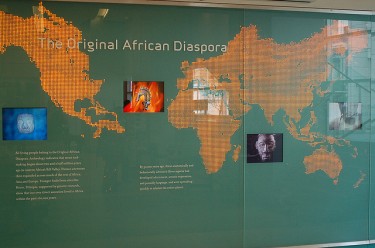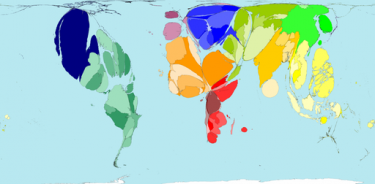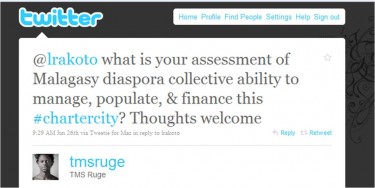Farafina outlines the goal of the conference in Mali and how they foresee the diaspora contributing to development in Mali [fr]:
Le Forum Tremplin propose de rencontrer sur leurs stands des entreprises et cabinet de recrutements du Mali, d'Afrique et de France dans les domaines de l'informatique, la banque-assurance, les
industries pour le compte d'entreprises (reconnues), en tout 200 emplois (seront disponibles)
The Forum Tremplin offers a gathering place for companies and recruiting agencies in Mali, Africa and France in the fields of information technology, banking, insurance and other industries for renowned companies. In total, 200 positions (will be available)

The Original African Diaspora by WhiteAfrican- Under CC License
In Cameroon, the conference that will take place in Yaounde from August 11-13th 2010, wants to draw inspiration from diaspora from other African nations [fr]:
Sous le thème, "La diaspora camerounaise, un véritable acteur du développement", il sera question pour les participants, de chercher les voies et moyens pour amener la diaspora camerounaise à s’impliquer davantage dans le processus de développement économique du pays. Pour le MECAM, « à l’instar des pays comme le Mali ou le Sénégal, où l’on sent une réelle implication de la diaspora dans le développement économique, la diaspora camerounaise qui apporte déjà beaucoup, le fera davantage dans un cadre réglementaire »
The theme of the conference is "The Cameroonian diaspora, a true agent of development". The idea is for all participants to find ways and means to bring the diaspora into committing further in the economic development of the country. According to the MECAM (Ministry of Economy and Commerce): just like in Mali or Senegal, where one can feel a true engagement by the diaspora in the economic development, the Cameroonian diaspora is certainly already bringing a lot to the table, but it would be able to do more within the regulated structure.

Net Emigration Map via WorldMapper.org - CC license
In Senegal, Ferdinand Mayega believes that for the Diaspora to effectively help the country, a focus on education and intellectual exchange to augment the knowledge capital and reach the tipping point towards development is key [fr]:
Tout ce challenge doit se faire dans un environnement propice au progrès et aux débats d’idées en associant les universitaires et chercheurs vivant en Afrique. Il peut s’agir de créer des masses critiques, des regroupements ou des pôles d’excellence pour le décollage de l’Afrique.
The challenge is that all of this must happen in an environment that is favorable to progress and to the exchange of ideas and engage scholars and researchers who reside in Africa. It is about reaching a critical mass of centers or hubs with top-notch quality of ideas for Africa to take off.
In a presentation on knowledge management in Morocco, Othmane Bouhali stresses out that there are specific know-hows on grid computing and supra-conductivity the Moroccan diaspora have acquired that they should voluntarily offer to share with others back home [fr]:faire appel aux différentes compétences de la diaspora marocaine, pour accomplirdes missions, sur place et /ou à distance, en appui ou dans le cadre des programmes de développement de leur pays d’origine, sur la base du volontariat et d’un engagement déontologique.
One must call onto the various expertises of the Moroccan diaspora to accomplish missions, on site or remotely, to support or within the structure of development program in their country of origin. This must be done on voluntary basis driven by a commitment based on deontology.
The role of non-governmental organizations (NGOs) in development through which most diaspora operate, have been intensely debated in Haiti, especially as the country is embattled in the recovery process after the recent catastrophic earthquake. Alice Baker reports on a recent conference, Cardicis, that offered a few policy suggestions on the role of NGOs [fr]:They explained that the larger NGOs have no interest in involving the Haitian government which hurts Haiti and its people. And the kicker: someone suggested NGOs should be nationalized to make them part of a government led system. The government could then coordinate and oversee the reconstruction effort while regaining a central role.Similar to Haiti, Sipakv notes that the role of diaspora for Madagascar has always been debated intensively, given its relatively important size. She also remarks that, just like the proposal in Haiti, the African Union suggested that NGOs could be represented in some kind of governmental capacity [fr]:
Il paraitrait que la diaspora a bien un role a jouer, l’Union Africaine le dit dans son Report of the conferences of the Diaspora and African NGOs on the popularization of science and technology, disponible ici:
"Providing human and technical resources;
Lobbying governments, institutions, and foundations to support the programs;
Being represented in government structures; (aha !)
Providing advice on policies and technical issues;
and Participating in networks to benefit communities and nations in the Diaspora"
...Assez controversee quand meme le fait de recommander a la diaspora d’etre integree dans les structures gouvernementales. Je n’ose meme pas penser aux implementations concretes d’une telle directive.
It appears that the diaspora has a role to play in development, the African Union says so in its Report of the conferences of the Diaspora and African NGOs on the popularization of science and technology, available here:
"Providing human and technical resources;
Lobbying governments, institutions, and foundations to support the programs;
Being represented in government structures; (aha !)
Providing advice on policies and technical issues;
and Participating in networks to benefit communities and nations in the Diaspora"
... It is a bit controversial for them to suggest that the diaspora should be integrated in the governmental structures. I don't even want to think about the practical implications of such initiatives.
There is some ideas to be explored further there says Apolo Ndyabahika on a post entitled "What Africa Needs" on Project Diaspora . The only way diaspora can effectively help with investment in projects back home is if government build the foundations of solid legislative regulations to reassure the diaspora and other investors:"Providing human and technical resources;
Lobbying governments, institutions, and foundations to support the programs;
Being represented in government structures; (aha !)
Providing advice on policies and technical issues;
and Participating in networks to benefit communities and nations in the Diaspora"
... It is a bit controversial for them to suggest that the diaspora should be integrated in the governmental structures. I don't even want to think about the practical implications of such initiatives.
our governments are starting to realize the importance of good legislation that protects local and foreign investments. As African countries work to lure investors to our lands we are challenged by investors to have strong property rights to protect their investments. Tanzania is in the process of working to use investment bonds to fund massive infrastructure project like a multi-billion dollar railway line to Rwanda. A limitation to this and other international investment is their weak legislation.The controversial idea of NGOs getting more integrated with government work is not as big of a controversy when compared to the reactions towards economist Romer's proposal for reducing global poverty, recently published in the Atlantic journal. The fragile legislative structure of some developing countries is also at the core of Romer's argument that advocates for creating cities within countries that would be under the administration of foreign entities in order to give them more control over their investments. Romer proposed such projects to be implemented in Madagascar with the leasing of large amounts of farm lands to foreign entities and it may have played a role in the ensuing political crisis:
Romer made his pitch for a charter city, and Ravalomanana responded that he wasn’t sure one was enough; if Romer could identify two rich countries willing to play the role of government trustee, it might be better to launch two parallel experiments.[..] Barely a year after launching his venture, Romer was on the brink of a rare coup: a nation of 20 million people was about to embrace a neo-medieval, neo-colonial scheme untested in the modern history of development. But then a different sort of coup occurred—the kind of coup, unfortunately, that underscores the obstacles to Romer’s project.Teddy MS Ruge, founder of Project Diaspora, was not pleased with Romer's idea and the all-too-common assumption that foreign groups would know better how to develop a country and overlook local talents and the diaspora. He asks on twitter about Romer's proposal and the situation in Madagascar:

Ruge's question is certainly pertinent to the debate on strategy for poverty reduction from all around the developing world and the empowerment of their citizens. It also remains unclear why some regions have lagged behind others when it comes to harnessing the potential of their respective diaspora to stimulate development.
[This article is cross-posted on Global Voices]

Daniel, yea I can see what you did there. I actually liked that part, but hehe I'm not that harsh like my dad with these things. He at all times tells me crazy stories again in the day and calls me a loser. I assume it's time I transfer out of my parents' basement LOL. Aaanyways, what about you? what does your dad assume xD" Anyway, in my language, there usually are not much good source like this.
ReplyDelete